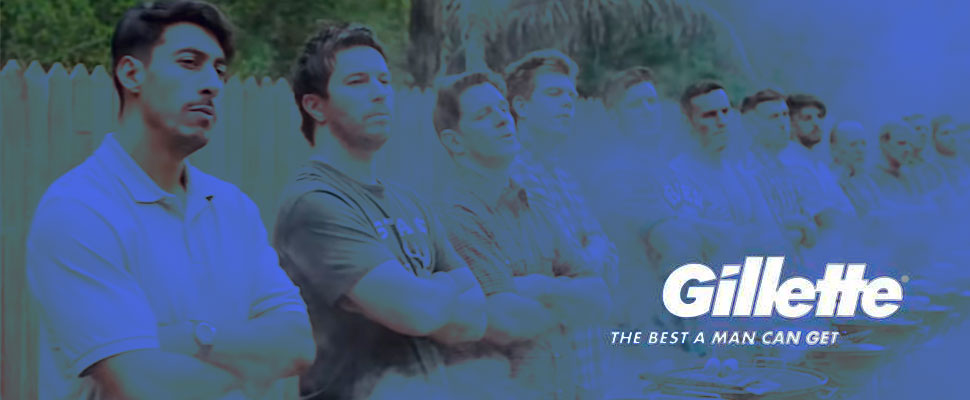Why are men bothered with Gillette’s commercial?
Listen this article
Last week a new Gillette commercial that denounces toxic masculinity ignited social media users

The commercial, entitled "We Believe: The Best Men Can Be ", is aimed especially at men and invites them to "be better". The message is simple and clear: in light of a panorama of bullying, sexual harassment, and mansplaining, it is clear that it is not the best version of men and that, with small changes, today's children (who will be the men of the future) will be a better version. After the launch of the commercial, many social media users exploded because of the message that gave this new publicity, What is it that bothered them so much?
Leer en español: ¿Qué molestó tanto a los hombres del comercial de Gillette?
Read also: Everything you need to know about 'Surviving R. Kelly'
The commercial
The commercial is part of The Best A Man Can Get campaign. On the website of the brand is accompanied by a text that explains the purposes of the campaign. "It’s time we acknowledge that brands, like ours, play a role in influencing culture. And as a company that encourages men to be their best, we have a responsibility to make sure we are promoting positive, attainable, inclusive and healthy versions of what it means to be a man," as the statement said. Likewise, he invites men to challenge and question the stereotypes of masculinity.
In addition to the commercial, which shows clear examples of how these stereotypes of masculinity can be challenged, Gillette says they will donate one million dollars annually for the next three years to non-profit organizations that run programs in the United States designed to inspire, educate and help men of all ages reach the best version of themselves and become role models for the next generation.
The reactions
A week after uploading it, the video has 671,000 likes and 1.1 million dislikes. That is to say that the users of the platform who reject the ad are almost twice as many who approve it or find it inspiring. Among the comments there are users who find it a nuisance to receive advice from a brand and because "a multinational tells me how I should be a man or how men should be."
On Twitter, on the other hand, a debate ensued around the announcement. Some users called the boycott of the company for "insulting its main target," while others said the brand had no moral authority to tell men how to be better and some others branded the commercial as feminist and ideological propaganda. Like everything on social media, you can find posts from different points of view: there are also those who defend the campaign and insult those who were offended by the commercial.
What is the annoyance?
This is not the first feminist commercial. For some years, feminist discourse has taken different spaces within the culture and one of them is advertising and entertainment. We have already seen Beyoncé dance on stage with the word FEMINISM in the background and we have also seen the advertising campaigns of brands such as Nike or Dove that invite women to empower themselves and to join to be stronger and more seriously.
Feminism advertisement has never been threatening to anyone. As long as it moves in the dynamics of the market and in the long run, what you are trying to sell is a product, this pop feminism is not radical. Sometimes it is not even efficient, since, since it seeks to sell or entertain, it avoids being intimidating or uncomfortable at all costs and therefore censorship.
Why, then, the annoyance with Gillette's commercial? Something that the forms of advertising feminism have in common is that it is always aimed at women. Nike tells Mexican women with their ad "run, avoid stereotypes, boxen, do not let yourselves be praised in the street, do not let yourselves be tied up if you do not want to." Dove does the same in their Beauty in your own terms campaign, in which she invites women to feel comfortable as they are and not to obey beauty mandates. And Always does it with their campaign #LikeAGirl, in which they promote that among women we resignify the expression "like a girl".
Gillette's ad, on the other hand, is aimed at men, invites them to be better, to have gestures that can serve as an example for children today. They are, for the first time in advertising feminism, men and not women who are invited to change. And this leads to another conclusion: if it is men who must change, it is because they are, in part, the culprits. Hence, I think, comes the discomfort that generated the announcement among many men: the ad appealed to them.
Is Gillette feminist?
The advertising of razor blades and deodorant brands has fueled for years the toxic masculinity that Gillette criticizes today. Always promising with their product to seduce women, these brands have helped to strengthen male representation. And not only this, for example, Dove, a brand of feminine products, advertises "being beautiful in our own way" at the same time that it sells us a product to remove makeup or to not wrinkle or to look whiter.
I applaud that for the first time in publicity the male audience has been appealed and I think that, more than the commercial itself, the public's reactions show how uncomfortable it is for some to question the masculinity we take for granted. However, one wonders if it would be better if instead of the million that they are going to donate, they would think about stopping charging more for their feminine products or that they would even stop dividing the products according to the consumer's gender. Yes, Gillette made uncomfortable some users, but he does not save himself (or save us).
LatinAmerican Post | Juliana Rodríguez Pabón
Translated from: '¿Qué molestó tanto a los hombres del comercial de Gillette?'





